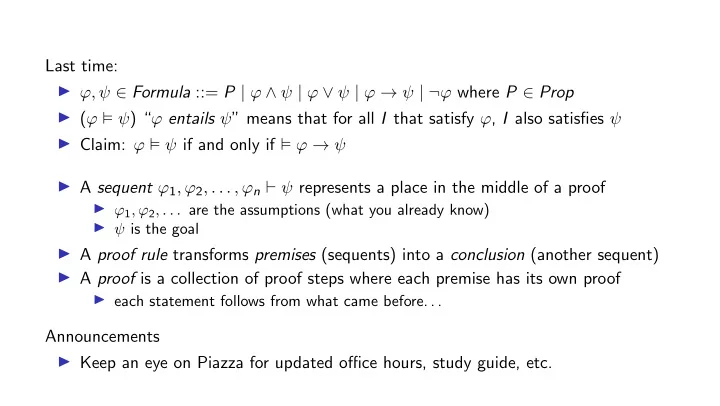

Last time: ◮ ϕ, ψ ∈ Formula ::= P | ϕ ∧ ψ | ϕ ∨ ψ | ϕ → ψ | ¬ ϕ where P ∈ Prop ◮ ( ϕ � ψ ) “ ϕ entails ψ ” means that for all I that satisfy ϕ , I also satisfies ψ ◮ Claim: ϕ � ψ if and only if � ϕ → ψ ◮ A sequent ϕ 1 , ϕ 2 , . . . , ϕ n ⊢ ψ represents a place in the middle of a proof ◮ ϕ 1 , ϕ 2 , . . . are the assumptions (what you already know) ◮ ψ is the goal ◮ A proof rule transforms premises (sequents) into a conclusion (another sequent) ◮ A proof is a collection of proof steps where each premise has its own proof ◮ each statement follows from what came before. . . Announcements ◮ Keep an eye on Piazza for updated office hours, study guide, etc.
· · · ⊢ ϕ ∧ ψ · · · ⊢ ϕ ∧ ψ · · · ⊢ ϕ · · · ⊢ ψ ( ∧ elimination) ( ∧ elimination) ( ∧ introduction) · · · ⊢ ϕ · · · ⊢ ψ · · · ⊢ ϕ ∧ ψ · · · ⊢ ϕ 1 ∨ ϕ 2 · · · , ϕ 1 ⊢ ψ · · · , ϕ 2 ⊢ ψ ( ∨ elimination) · · · ⊢ ψ · · · ⊢ ϕ · · · ⊢ ψ · · · ⊢ ϕ ∨ ψ ( ∨ introduction) · · · ⊢ ϕ ∨ ψ ( ∨ introduction) · · · ⊢ ϕ · · · ⊢ ϕ → ψ · · · , ϕ ⊢ ψ ( → elimination) · · · ⊢ ϕ → ψ ( → introduction) · · · ⊢ ψ · · · , ϕ ⊢ ϕ (assumption) · · · ⊢ ϕ ∨ ¬ ϕ (law of excluded middle) · · · ⊢ ϕ · · · ⊢ ¬ ϕ (absurd) · · · ⊢ ψ
◮ Defn: ϕ 1 , . . . , ϕ n ⊢ ψ means that there exists a proof tree for ϕ 1 , . . . , ϕ n ⊢ ψ . ◮ Defn: ϕ 1 , . . . , ϕ n � ψ means that every interp. satisfying all ϕ i also satisfies ψ ◮ Claim: if ( ϕ i ) ⊢ ψ then ( ϕ i ) � ψ ( ⊢ is sound ) ◮ Claim: if ( ϕ i ) � ψ then ( ϕ i ) ⊢ ψ ( ⊢ is complete ) ◮ Propositional logic: ϕ, ψ ∈ Formula ::= P | ϕ ∧ ψ | ϕ ∨ ψ | ϕ → ψ | ¬ ϕ ◮ Predicate (first order) logic: ϕ, ψ ∈ Formula ::= P | ϕ ∧ ψ | ϕ ∨ ψ | ϕ → ψ | ¬ ϕ | P ( x ) | ∀ x , P | ∃ x , P ◮ Claim: there exists a sound and complete proof system for first-order logic ◮ Claim (G¨ odel’s theorem): any system that is powerful enough to describe N cannot be both sound and complete
Recommend
More recommend